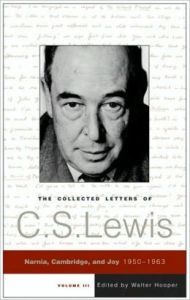 My intensive reading of C. S. Lewis letters is part of another of my sabbatical projects, with a book as the end goal. This has been no drudgery; rather, it has been fascinating to delve into them and see how Lewis responds to his American correspondents.
My intensive reading of C. S. Lewis letters is part of another of my sabbatical projects, with a book as the end goal. This has been no drudgery; rather, it has been fascinating to delve into them and see how Lewis responds to his American correspondents.
Often, he writes to children who have read his Narnia books. One of his regular child correspondents was Joan Lancaster, who, for her age, was quite mature and thoughtful. Lewis seemed to take an extra interest in her advancement as a writer. One of his letters to her could easily have been written to an adult writer trying to hone his/her craft. I like the advice he gives:
1. Always try to use the language so as to make quite clear what you mean and make sure yr. sentence couldn’t mean anything else.
2. Always prefer the plain direct word to the long, vague one. Don’t implement promises, but keep them.
3. Never use abstract nouns when concrete ones will do. If you mean “more people died” don’t say “mortality rose.”
4. In writing. Don’t use adjectives which merely tell us how you want us to feel about the thing you are describing. I mean, instead of telling us a thing was “terrible,” describe it so that we’ll be terrified. Don’t say it was “delightful”: make us say “delightful” when we’ve read the description. You see, all those words, (horrifying, wonderful, hideous, exquisite) are only like saying to your readers “Please will you do my job for me.”
5. Don’t use words too big for the subject. Don’t say “infinitely” when you mean “very”: otherwise you’ll have no word left when you want to talk about something really infinite.
We all could use some timely advice like that—it would be “infinitely” helpful.
